When he announced the federal indictment of former President Trump for allegedly mishandling classified documents, Justice Department special counsel Jack Smith said there is “one set of laws in this country, and they apply to everyone.”
But that isn’t necessarily true.
According to many legal and political scholars and the Justice Department itself, there are different rules for sitting U.S. presidents, including that they cannot be criminally prosecuted while in office.
That rule — which is both long-standing and open to debate — is at the center of a staggering legal crisis looming before the nation as the twice-indicted former president seeks a second term.
Trump’s precarious legal position as a leading presidential contender has put the federal government’s executive and judicial branches on a high-speed collision course, scholars say, and could lead to political and constitutional crises if not averted by voters.
A Trump victory in the November 2024 general election would not be precluded by the pending charges, potential convictions or even Trump’s imprisonment. And it would test the nation’s separation of powers and the presumed privileges of the presidency like never before.
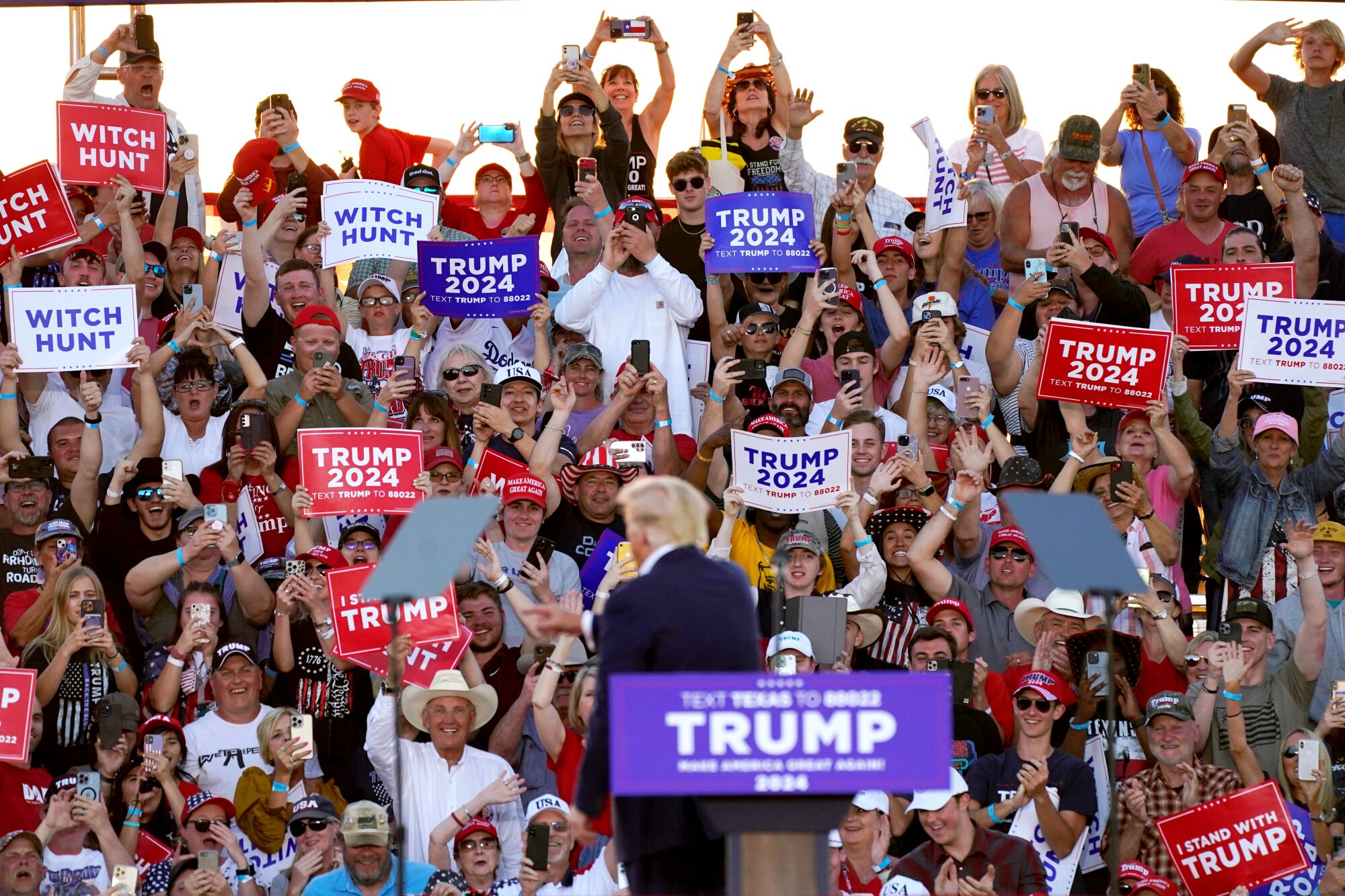
Supporters cheer for Trump at a March campaign rally at Waco Regional Airport in Texas.
(Nathan Howard / Associated Press)
Trump’s reelection could spur court battles over his ability to pardon himself or to direct the Justice Department to dismiss charges against him in any ongoing federal cases, and over his continued vulnerability in ongoing state prosecutions. Those include cases in New York, where he has been indicted, and Georgia, where he is under investigation.
If any of the cases are decided before the election, a Trump victory could spark legal battles over the terms of any convictions and whether he would still be subject to them as president.
The circumstances are so unprecedented, and the law around presidential privileges so unsettled, that it is impossible to know how all of Trump’s legal and political woes will play out, experts say. But it won’t be pretty.
“We’re certainly in completely uncharted waters, even now,” said Robert Mintz, a former federal prosecutor who now represents high-profile federal
defendants.
“The founding fathers never anticipated anything like this,” said Robert Shrum, director of USC’s Center for the Political Future.
The cases
Trump is the first U.S. president to be indicted, and it has happened twice in the last few months.
In April, Manhattan Dist. Atty. Alvin Bragg announced the indictment of Trump in New York on 34 felony counts of falsifying business records as part of an
alleged scheme to “conceal damaging information and unlawful activity” from voters before and after the 2016 election. The scheme, Bragg said, included the use of hush money by Trump and his team to bury negative stories, such as adult film star Stormy Daniels’ claims of an affair.
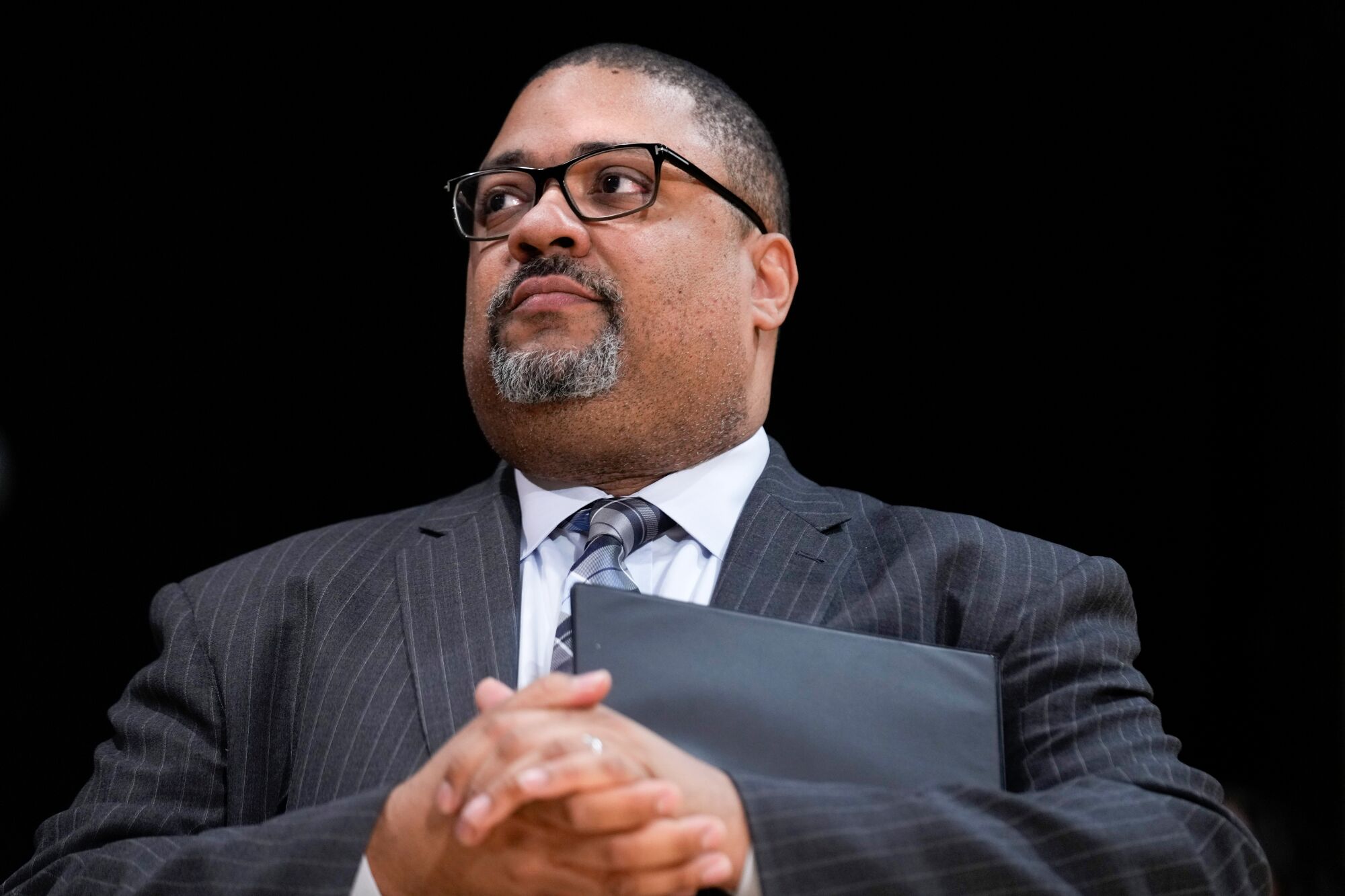
Manhattan Dist. Atty. Alvin Bragg in April announced the indictment of former President Trump in New York.
(Seth Wenig / Asociated Press)
To carry out the scheme, Bragg alleged, Trump and others “violated election laws and made and caused false entries in the business records of various entities in New York” and “mischaracterized, for tax purposes, the true nature of the payments.”
Trump has pleaded not guilty. A trial has been set for March, but it could be delayed. Trump could face years in prison.
Smith this month announced the federal indictment of Trump on 37 felony charges related to his alleged mishandling of highly sensitive government documents from his time in the White House, including 31 counts of violating the Espionage Act.
The indictment alleges that Trump knew the documents were classified and illegal for him to possess, retained them and showed them to others without proper clearances, left them dangerously exposed in storage at his Mar-a-Lago club in Florida and actively subverted attempts by the federal government and his own attorneys to retrieve them.
The indictment alleges that the documents included records detailing U.S. nuclear programs, nuclear capabilities of foreign nations, defense and weapons capabilities of the U.S. and foreign countries and potential vulnerabilities of the U.S. and its allies to military attack.
The indictment outlined the evidence against Trump in great detail, including a recording in which he allegedly acknowledged that a document he had was never declassified — undermining his own claim that he had every right to retain the records.
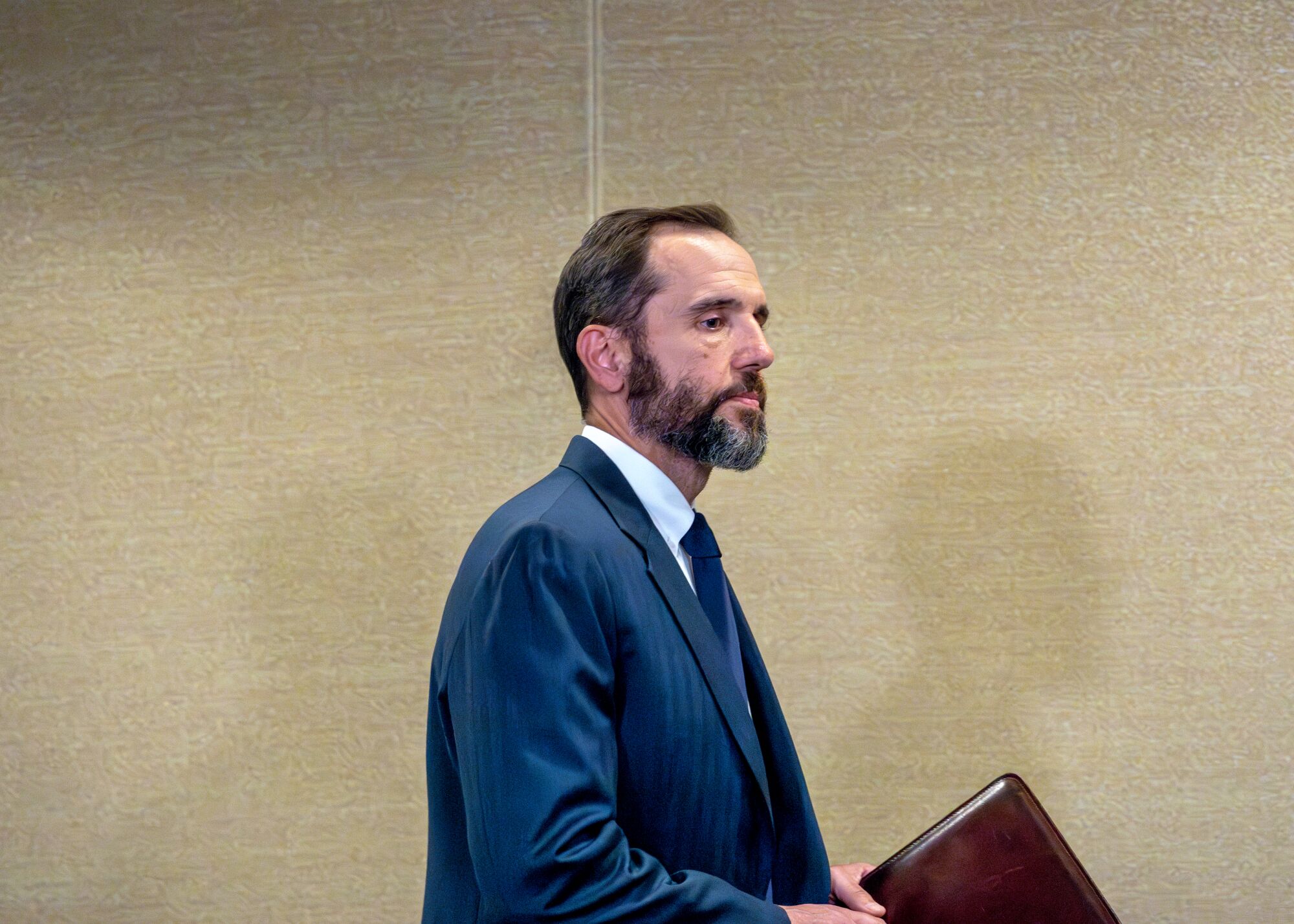
Special counsel Jack Smith speaks to reporters this month in Washington.
(Alex Brandon / Associated Press)
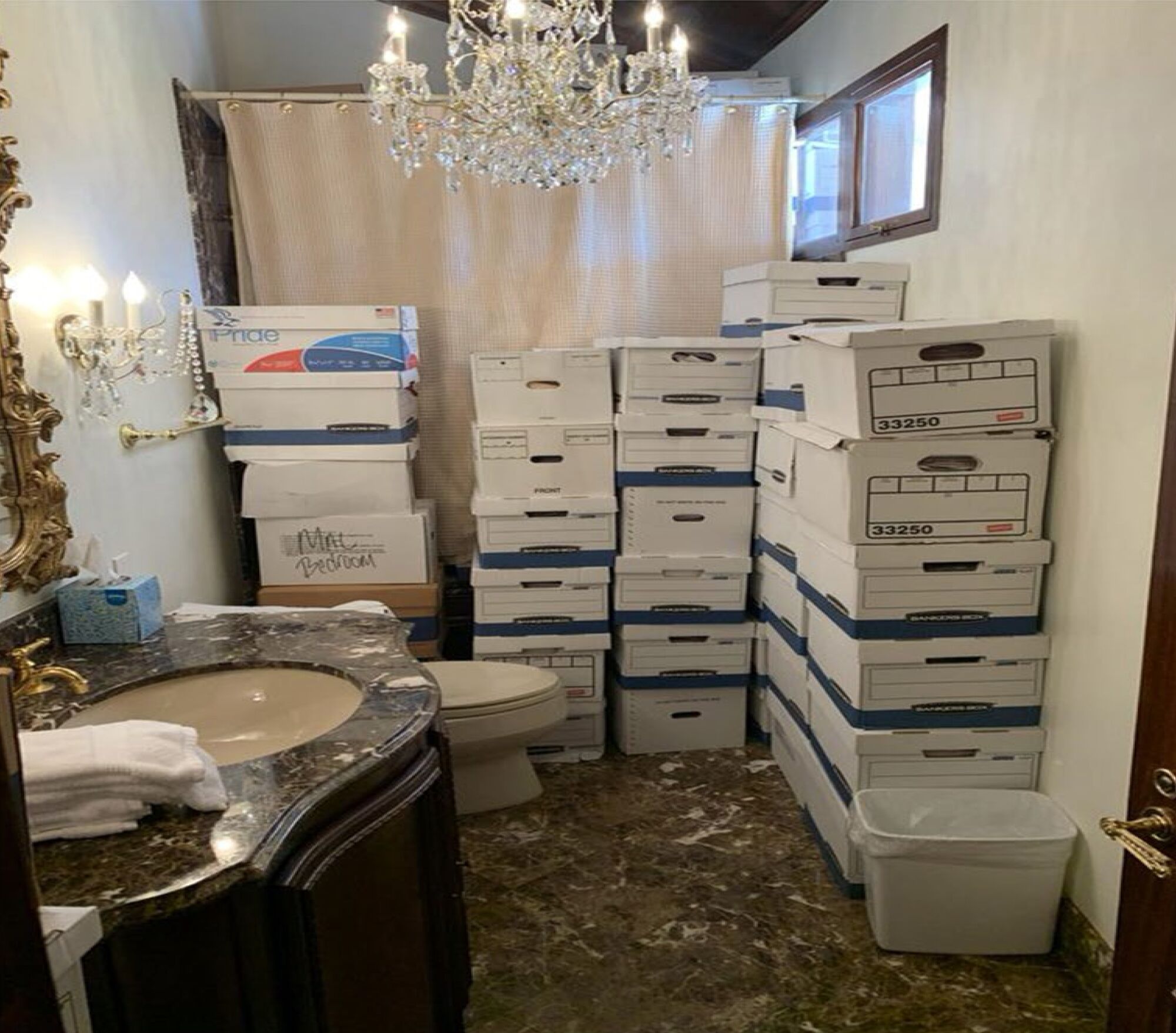
Boxes of records are stored in a bathroom at Trump’s Mar-a-Lago estate, as seen in a photograph contained in the indictment against him.
(Justice Department via Associated Press)
Trump has pleaded not guilty. A trial has been set for August, but that is likely to change given the complexity of the case. The government has asked for a delay until December. Trump again faces years in prison if convicted, though his sentence would depend on a variety of factors.
In addition to the indicted cases, Smith is conducting a separate investigation into Trump’s efforts to overturn the 2020 election and his role in the Jan. 6 insurrection at the U.S. Capitol, while prosecutors in Fulton County, Ga., are investigating attempts by Trump to overturn the 2020 election there.
Trump has denounced all the investigations as part of a politically motivated “witch hunt.”
In New York, Trump has denied having an affair with Daniels, denied direct involvement in any hush money payments, blamed others — including those who implicated him, such as his former attorney Michael Cohen — and ridiculed Bragg’s case as legally dubious.
In the classified documents case, Trump’s defense has varied from claims that he was within his rights to have the documents to an argument that he was “very busy” when federal authorities initially came asking for the records and was unable to immediately comply.
Legal experts have said the strength of Bragg’s case remains unclear, in part because the New York prosecutor didn’t fully detail in the indictment the evidence he has against Trump. They largely agree on the substantial strength of Smith’s case, noting the striking amount of evidence detailed in that indictment.
In the long run, however, the strength of the cases may matter less than the election.
“Even if he got convicted,” Shrum said, “he could still run for president.”
Presidential privileges
While the Constitution outlines the process by which Congress can impeach a sitting president — Trump was twice impeached by the House but never convicted by the Senate — it is silent on the question of whether a sitting president can be prosecuted through normal judicial channels.
The courts have likewise been quiet on the question, experts said, though the Justice Department has weighed in.
In 1973 and again in 2000, when Presidents Nixon and Clinton were in hot water, Justice Department officials issued opinions concluding that sitting presidents cannot be indicted or prosecuted.
Both opinions hinged on a core principle of American democracy: the separation of powers. They concluded that any judicial interest in charging a sitting president with a crime — and subjecting him or her to the physical and mental demands of a potentially lengthy and politically fraught criminal trial — was outweighed by the mandate from voters to perform the onerous executive duties of the presidency.
On balance, department officials reasoned, it would be untenable for any individual prosecutor to have the power to target and temporarily incapacitate through criminal proceedings the head of the executive branch.
In the 2000 opinion, Randolph D. Moss, the assistant attorney general at the time, wrote that indicting or prosecuting a sitting president “would unconstitutionally undermine the capacity of the executive branch to perform its constitutionally assigned functions.” So sitting presidents — and sitting presidents alone in all of government — are “immune” from such actions.
“Where the President is concerned,” Moss wrote, “only the House of Representatives has the authority to bring charges of criminal misconduct through the constitutionally sanctioned process of impeachment.”
Moss, now a federal judge, did not respond to a request for comment.
His opinion was reiterated by Robert S. Mueller III, the special counsel brought on by the Justice Department in the early years of Trump’s presidency to investigate possible collusion between Trump’s 2016 presidential campaign and Russia.
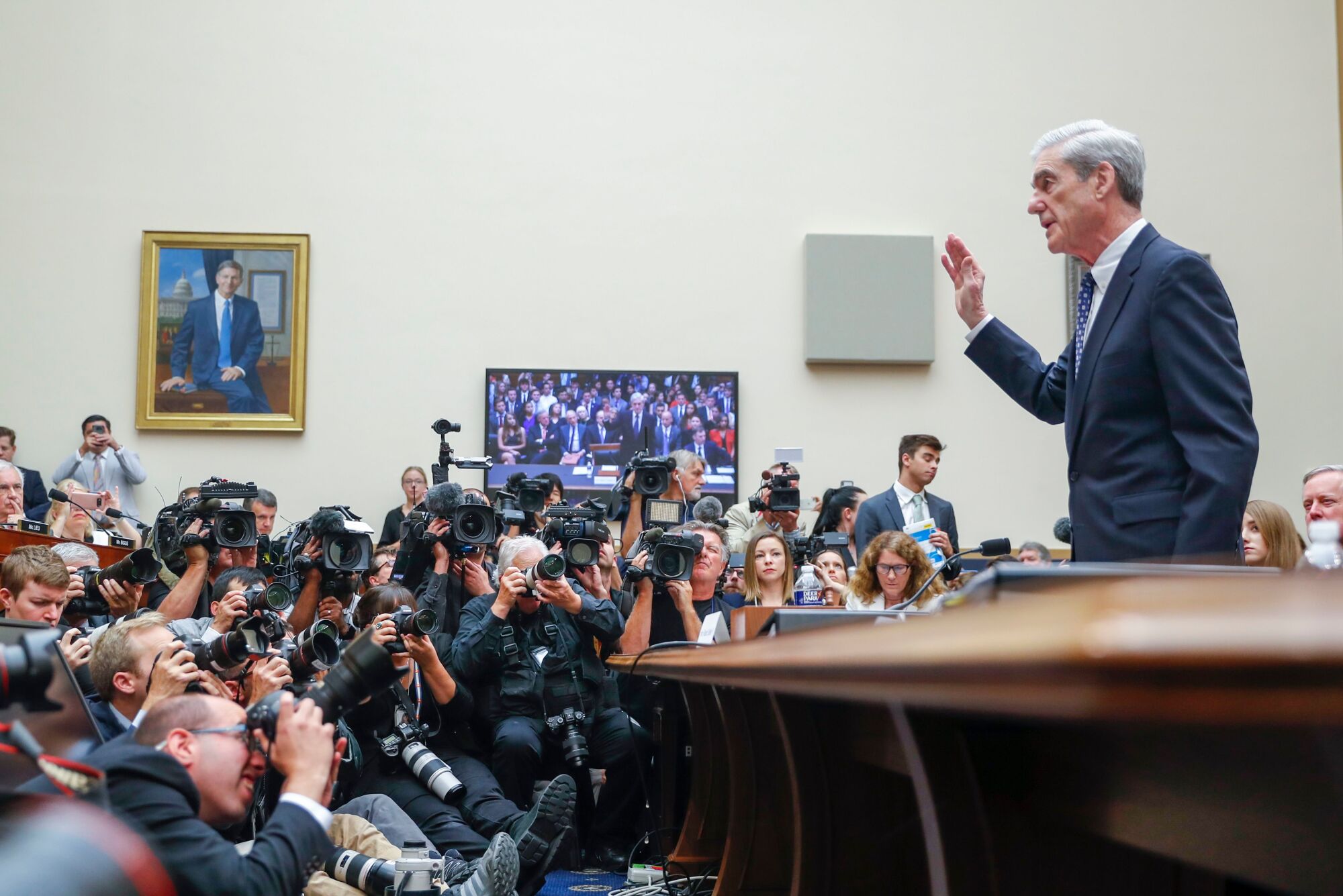
Former special counsel Robert S. Mueller III prepares to testify before the House Judiciary Committee during a hearing about Russian interference in the 2016 election and possible efforts by Trump to obstruct Mueller’s investigation.
(Shawn Thew / EPA/Shutterstock )
Mueller and his team of prosecutors indicted or secured guilty pleas from 34 people and three companies during the nearly two-year investigation, including Trump’s campaign manager, former national security advisor and Cohen, the president’s personal attorney. But when it came to Trump and whether he obstructed justice by attempting to thwart the probe, Mueller punted.
Citing the Justice Department’s position that sitting presidents can’t be indicted, Mueller decided it would be unfair to conclude one way or the other whether Trump had committed a crime.
“Accordingly,” Mueller wrote, “while this report does not conclude that the President committed a crime, it also does not exonerate him.”
Trump’s critics denounced the double standard afforded the president and noted that Mueller’s team had collected substantial evidence to suggest
obstruction. Directly contradicting Mueller’s words, Trump claimed that the report offered him “complete and total EXONERATION.”
Based on that history, legal experts say, Trump is clearly more vulnerable now, while he is out of office, than he was during his first term as president or would be were he to win a second term. That has created the intense legal window in which cases have been brought, but it’s unclear whether they will be adjudicated prior to the election — or if any outcomes will even matter if Trump wins a second term.
If Smith’s federal case were pending when Trump won the election, “then the decision about whether to pursue the case would be up to the attorney general at the time, and the Department of Justice could elect to simply dismiss the charges and not pursue them,” Mintz said.
If the New York case or one in another state were pending when he won the election, prosecutors in those states would similarly be forced to consider whether they could continue trying the president. If they decided they could and pushed forward, Trump would likely challenge their authority — potentially taking the question of whether a sitting president can be prosecuted to the U.S. Supreme Court, which leans conservative and includes three Trump appointees.
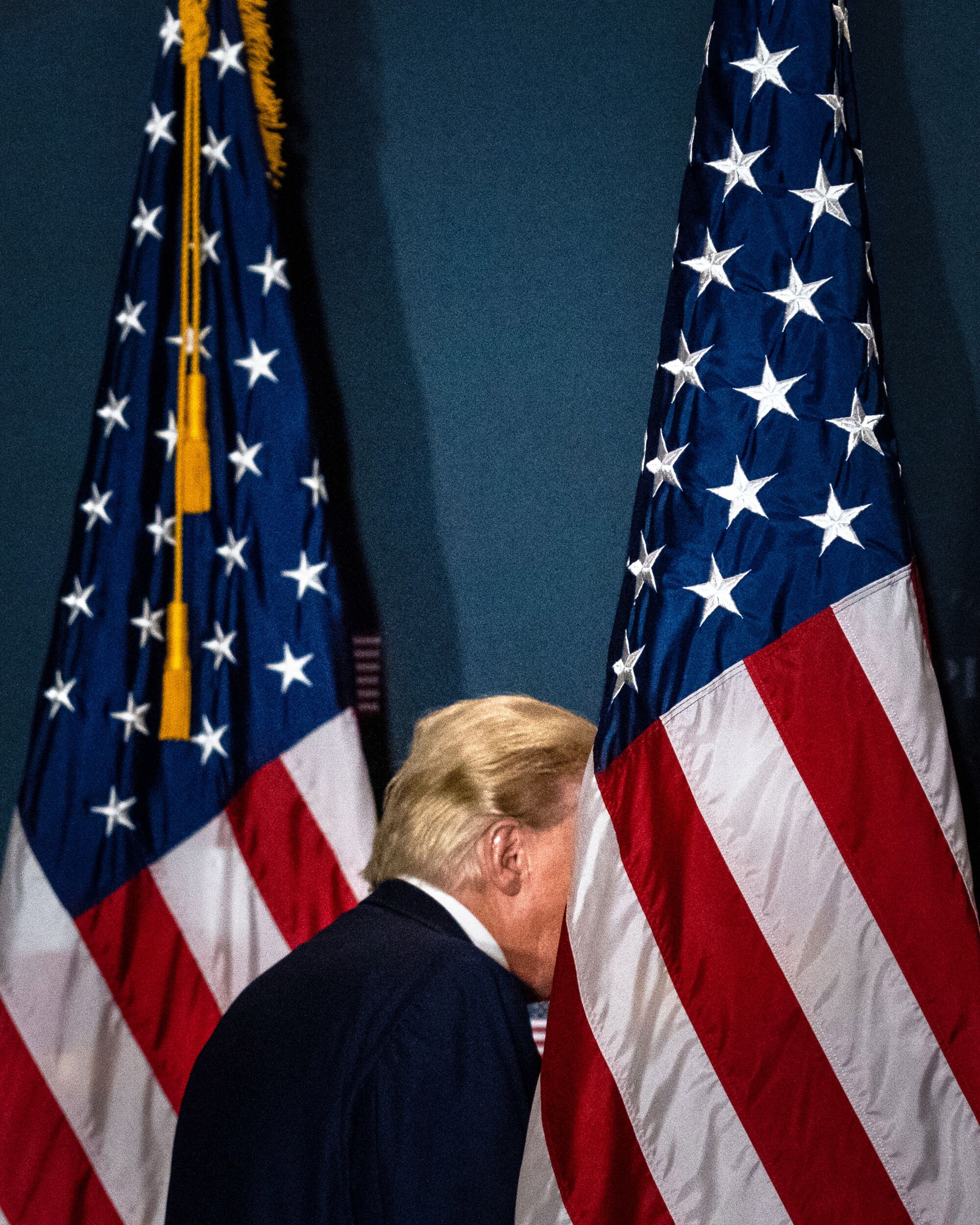
In addition to the indicted cases, there is a separate investigation into Trump’s efforts to overturn the 2020 election and his role in the Jan. 6 insurrection at the U.S. Capitol, while prosecutors in Fulton County, Ga., are investigating his attempts to overturn the 2020 election there.
(Kent Nishimura / Los Angeles Times)
If Trump were convicted on any of the federal or state charges before the election, what would happen with those convictions and any sentences that have been handed down is anyone’s guess, Mintz said, and “raises a host of unprecedented legal questions” that would no doubt prompt their own legal battles, particularly if Trump sought to pardon himself.
Shrum said he considers the probability of Trump going to trial before the election a “long shot,” in part because Trump hopes to win the election first and “is trying to delay this as much as possible. His lawyers will file every motion they can.”
If he does win, Shrum said, Trump will likely seek to “politicize the Justice Department” to immediately clear himself of any wrongdoing and “go after his political enemies.”
Daniel Farber, a professor at UC Berkeley Law School who studies presidential power, said there is a less controversial scenario wherein Trump gets elected and simply asks Justice Department holdovers from the Biden administration to reconsider the cases against him in light of the department’s standing policy that sitting presidents can’t be prosecuted.
But Trump is brash, Farber said, and is just as likely to come in and clear out the top ranks of the Justice Department, in a move akin to Nixon’s 1973 “Saturday Night Massacre,” in which the president fired his attorney general, deputy attorney general and the special counsel investigating the Watergate scandal.
Whatever happens, Farber said, officials overseeing the cases against Trump will have to make tough decisions if he wins the election, given the protections he’d gain.
“It’s a real bind,” Farber said. “How do you weigh the rule of law versus respecting the result of the election?”
Up to the voters
Experts agree that voters hold the strongest hand, as they alone have the power to deny Trump reelection.
The criminal cases are powerful in part because they are playing out not just in court but in the court of public opinion — and could sway voters.
A poll by the UC Berkeley Institute of Governmental Studies and co-sponsored by The Times — conducted after Bragg filed his indictment but before Smith’s — found that 86% of likely Republican voters in California believed that the investigations of Trump were more about politics and political revenge than about law and justice, and 70% felt they should be halted for the good of the country.
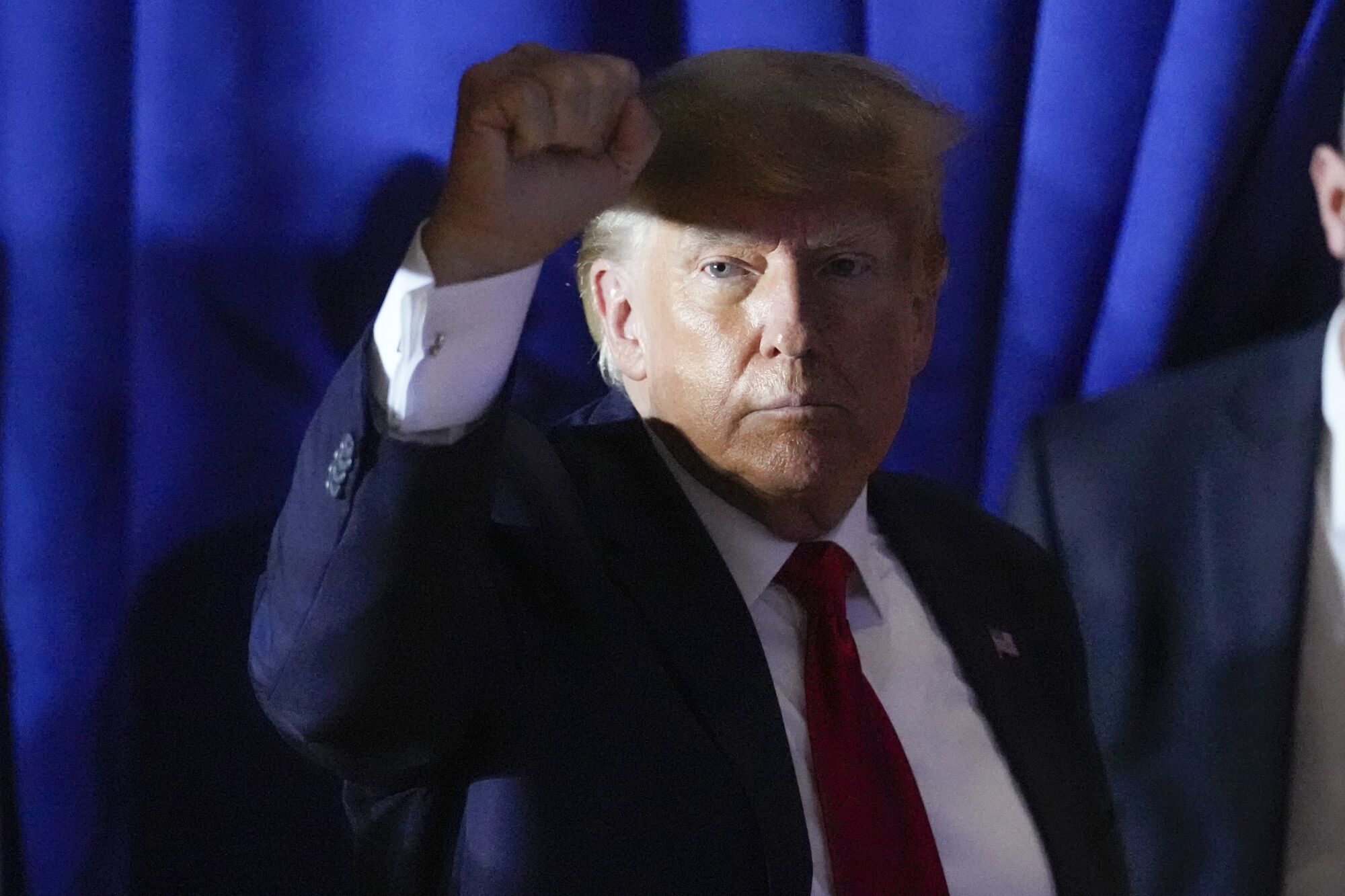
A recent poll found that 86% of likely Republican voters in California believed that the investigations of Trump were more about politics and revenge than about law and justice, and 70% felt they should be halted for the good of the country.
(Charles Krupa / Associated Press)
However, a majority of California voters overall, who skew Democratic, rejected those ideas, the poll found, with about 6 in 10 saying the investigations “aim to hold Trump accountable for his unlawful actions.”
Meena Bose, director of the Peter S. Kalikow Center for the Study of the American Presidency at Hofstra University, said American democracy is grounded in the law but also on “norms and expectations of responsibility” among elected officials that have repeatedly been challenged by presidents, including Nixon, Clinton and Trump.
All of the “unprecedented events and controversies of the Trump presidency and post-presidency” have perhaps presented a “complicated path” for Trump to
return to the White House, Bose said, but it is also “pretty clear that the former president’s core supporters are with him no matter what.”
Shrum said the revelations in the indictments are damning, and Trump’s responses aren’t helping him. Trump hasn’t just dismissed the cases as meritless but has suggested that, if reelected, he would go after the Justice Department and even the U.S. Constitution in order to protect himself and attack his political opponents, Shrum said.
That messaging raises “threats to democracy,” evokes the chaos of Trump’s first term and could drive key voting groups to the polls to vote against him, Shrum said — if not in the Republican primary, then in the general election.
“If that happens and he loses independents, and Gen Z turns out and suburban women turn out, I don’t see the equation that gets him elected to a second term,” Shrum said.
Gabriel Lenz, a political science professor at UC Berkeley, said there is a flip side, in that Trump has had political success in suggesting to supporters that hisindictments are proof of a corrupt system that is out to get him.
“The indictments just play into Trump’s narrative that the Democrats are using the government unfairly to go against their leader,” Lenz said. “That just will
increase Republicans’ tolerance for Trump’s own backsliding on democracy.”
Eric Schickler, also a political science professor at Berkeley, said Trump has long benefited from other Republican leaders being so afraid of the party’s base turning on them if they speak out against him that they largely remain silent about — or dismiss as unfair — his troubles, legal and otherwise.
However, since Smith filed his detailed indictment over the classified documents, more Republicans — including former Trump White House officials such as Atty. Gen. William Barr and primary rivals such as Gov. Chris Christie — are speaking out against the former president.
Whether that growing criticism will make any difference remains to be seen, Schickler said.
“One thing we’ve seen with Trump,” he said, “is that it’s hard to get a lot of political voters to change their minds about him.”
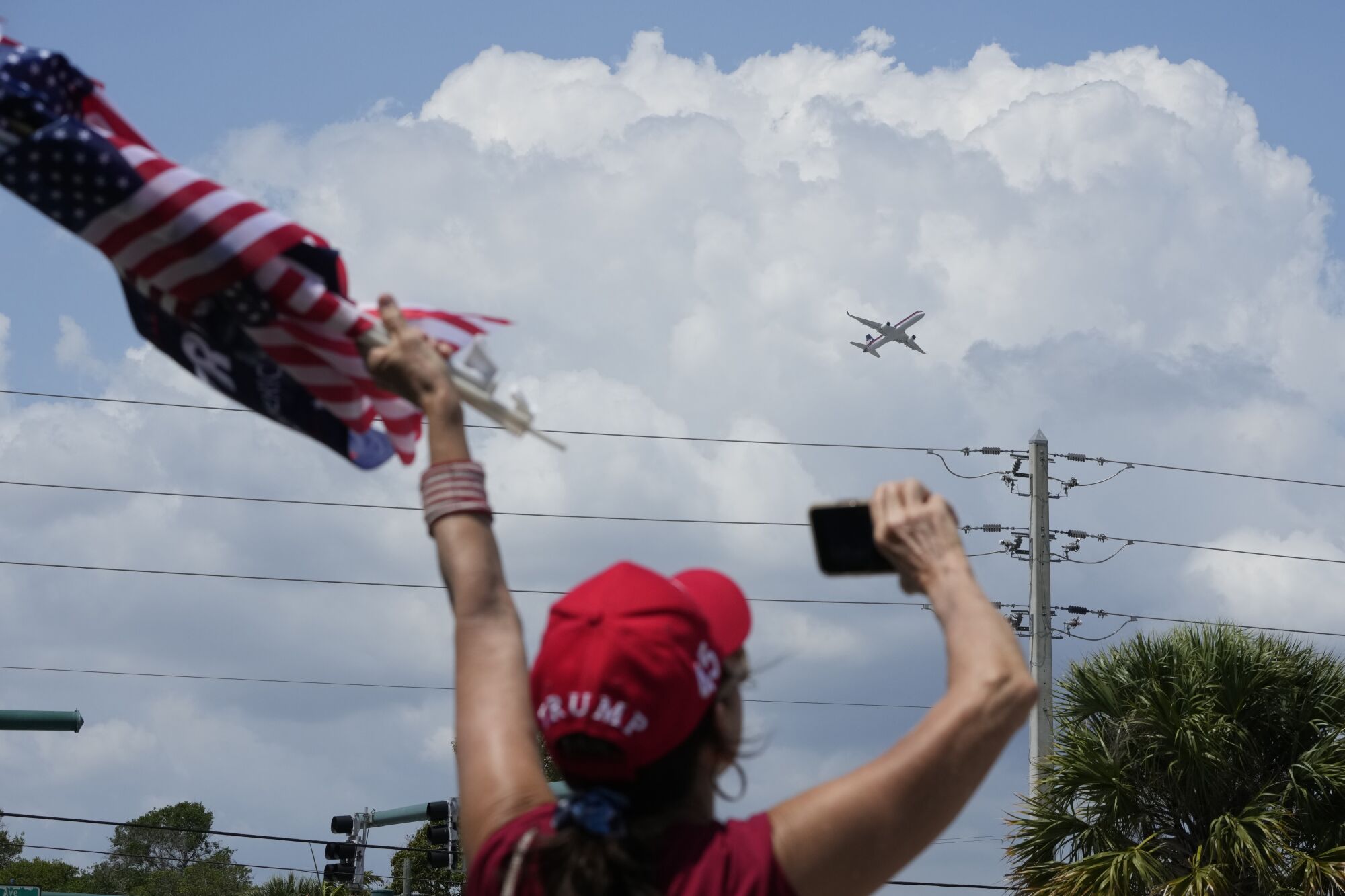
A supporter waves as Trump’s plane takes off from Palm Beach International Airport in April, when he traveled to New York for his booking and arraignment on charges arising from hush money payments during his 2016 campaign.
(Wilfredo Lee / Associated Press)
Stay connected with us on social media platform for instant update click here to join our Twitter, & Facebook
We are now on Telegram. Click here to join our channel (@TechiUpdate) and stay updated with the latest Technology headlines.
For all the latest World News Click Here
